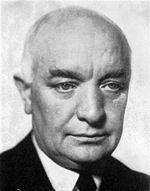Per Albin Hansson, Date of Birth, Place of Birth, Date of Death
TweetPer Albin Hansson
Swedish politician, Prime Minister of Sweden between 1932–1936 and 1936–1946About Per Albin Hansson
- Per Albin Hansson (28 October 1885 – 6 October 1946) was a Swedish politician, chairman of the Social Democrats from 1925 and two-time Prime Minister in four governments between 1932 and 1946, governing all that period save for a short-lived crisis in the summer of 1936, which he ended by forming a coalition government with his main adversary, Axel Pehrsson-Bramstorp.
- During World War II, in which Sweden maintained a policy of neutrality, he presided over a government of national unity that included all major parties in the Riksdag with the exception of the Communist Party.
- Forging the Social Democratic grip on Swedish politics that would last throughout the century, Hansson left an astounding legacy on his party as well as creating the idea of Sweden to become "Folkhemmet", "The People's Home".
- This remained intact until the early 1990s, including a strict policy of neutrality, a wide-stretching welfare state through parliamentary legislation, and reformist social corporatism rather than Marxist socialization of the means of production.
- Following the war, Hansson formed a Social Democratic cabinet enjoying absolute majority in the Riksdag before succumbing to a heart attack on his way home from work late at night on 6 October 1946. During Hansson's fourteen years as Prime Minister of Sweden, a wide range of reforms were realised, such as subsidised dental care, income-tested child allowances for invalidity pensioners and widows, maternity allowances through voluntary sickness insurance, and a 1935 law that introduced state subsidies for the construction of apartment houses for families with three or more children, combined with housing allowances for families with more than two children living in these houses.
Read more at Wikipedia


 Date of Birth:
Date of Birth:  Place of Birth: Malmö, Skåne County, Sweden
Place of Birth: Malmö, Skåne County, Sweden